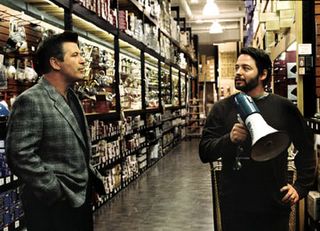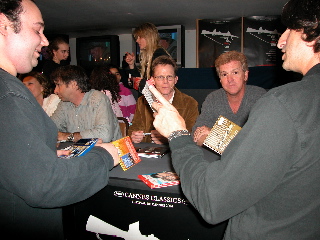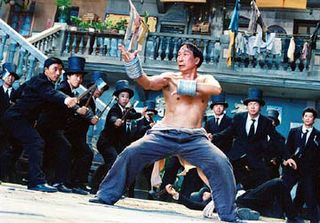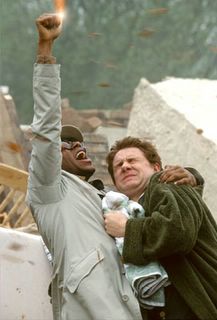The Last Shot
This movie barely lasted a week in theaters, despite a well-rounded cast of familiar actors and the writing and directing talents of Jeff Nathanson, who frequently collaborates with a guy you may have heard of named Steven Spielberg.
So I figured it had to be really bad. I mean, why else would a Matthew Broderick and Alec Baldwin movie get the shaft, essentially going directly to DVD?
Well, the good news is, it's not a horrible disaster. In fact, there a lot to like about The Last Shot, a very dark comedy that isn't afraid to get, well, dark. It just doesn't hold together well, sacrifices a lot of believability in favor of some pretty weak gags, and kind of falls apart at the end. But, you know, other than that...it's alright.
I think the biggest problem facing Nathanson (who makes his directorial debut with this film) is the essential familiarity of the storyline. What we have here is a wacky, satirical Hollywood insider comedy. It's a well-worn genre, and even though the remarkable story behind The Last Shot is true, the movie is still weighed down by its formula like the proverbial albatross.
In fact, you could basically say the movie is Frank Oz's winning 1999 comedy Bowfinger in reverse. In that film, maverick no-budget indie filmmaker Steve Martin knows that he has no real budget or actors for his movie, but he convinces an entire cast and crew of friends otherwise in a wacky attempt to get a film made. In The Last Shot, FBI man Alec Baldwin gets to government to finance a phony film production in an attempt to ensnare a distant, forgotten cousin of John Gotti (ably played by Tony Shalhoub).
But while Bowfinger was a free-wheeling farce, one of Steve Martin's over-the-top, classic kind of comedies, The Last Shot is far more muted, dry and cynical. Which is fine. Great, even. I mean, I like silly, broad comedies, and Bowfinger was a lot of fun (particularly Eddie Murphy's multiple roles), but I have no problem with bringing a bit more edge to the table.
Unfortunately, any grit or edge Nathanson may have developed is undermined by the ludicrous nature of the film's action.
There's the movie within the movie, the film naive Steven Schats (Matthew Broderick) believes he's directing. It's called Arizona, based on the true story of his sister's struggle with breast cancer. In his screenplay, his sister Charlotte makes a journey on foot through Arizona, eventually settling in a Hopi Indian spirit cave at the bottom of the Grand Canyon to die.
First, Baldwin's undercover agent Joe Devine must convince perennial loser Schats that he's a real film producer, despite having no actual knowledge about moviemaking at all. Then, he must convince Schats to film his movie (called Arizona and set at the Grand Canyon) in Rhode Island, because that's where Gotti's cousin has been stationed.
Think about that for a second. Why would Devine choose a script called Arizona when he knows the film needs to be made in Rhode Island. Surely in Los Angeles, he could find a script that could theoretically be made in a New England location. The reason is, Nathanson can squeeze a cheap gag out of making the town of Providence, Rhode Island into the Arizona desert. (Also, I should mention that this same e is pulled off better in David Mamet's similar State and Main, where screenwriter Philip Seymour Hoffman is asked to remove references to an old mill from his script entitled "The Old Mill.")
When you do a joke like that, you're sacrificing the movie's integrity. We're supposed to believe in Devine as a capable, clever agent, a man who could think up and execute this complicated and intricate scheme. Yet he seems unable to function undercover on even the most basic level.
You get a sense with The Last Shot that Nathanson really wants to skewer some familiar Hollywood types, and though his film is pretty brave about troubling, dark or morbid content, he's kind of unwilling to really take the jokes as far as they need to go.
Take Toni Collette's character, box office sensation Emily French. She's extremely similar to the other "ditzy superstar" characters we've seen in a lot of showbiz satires in the last few years - like Sarah Jessica Parker's neurotic leading lady in State and Main (which also featured Alec Baldwin), or Anna Faris' Cameron Diaz take-off in Sofia Coppola's Lost in Translation.
Collette's pretty good in the role (except for one really unnecessary and humiliating scene requiring her to pee in a cup in a crowded restaurant...more on that later...), but I wish we could have seen Nathanson lampoon starlets with a bit more bite. He's been around them for a few years now, what with writing big-budget flicks like Catch Me If You Can. Surely he's had a few insights into their character.
This actually leads me into my single largest bone of contention with The Last Shot. In almost every other way, the movie is a genial and likable comedy. It's really about friendship more than sending up show business, and I genuinely liked the way Baldwin and Broderick play off one another. But what ruins this tone, and comes pretty close to wrecking havoc on the entire film, is a kind of vague but over the top mysogeny.
All of the women appearing everywhere in the film are violent, narcissistic and, on some level, mentally unbalanced. In a glorified cameo appearance, Joan Cusack plays a frenzied, neurotic, unhinged production executive. She relates a harrowing story of domestic abuse to Baldwin in a monologue that's supposed to be funny, I suppose, but which comes off as decidedly crass, mean-spirited and not at all amusing, despite Cusack's best efforts.
Then there's Calista Flockhart, who is in the movie only to be debased, ridiculed and mocked. She plays the wannabe actress who's been schtupping Schats for many years in the hopes of making the big time. When it doesn't happen for her, she becomes vindictive. The running joke about her character is that she hates dogs, and is always threatening them with bodily harm. (Seriously.)
And finally Collette, the oversexed, imbecilic, self-involved movie star who is forever taking her clothes off and urinating in public. I still don't get that scene at all. She's having dinner with Devine and Schats, trying to convince them to give her the role, and then, as a way of insisting she's over her drug problem, she slips a wine glass under her dress and takes a leak right there at the table.
It's not funny. It's shocking, I suppose, and crude, but it makes her character out to be an insane person, which I don't think was the point. Again, Nathanson prefers to go for the cheap laugh than to maintain the integrity of the character he'd written.
Plus, there are constant jokes at the expense of breast cancer victims. Honestly, I can't recall seeing a film that found violence towards women so utterly amusing. The character in Broderick's film not only dies in a cave of cancer, but she's bitten by a snake as well, spurning Flockhart's desperate actress to stab herself in the thigh with a fork in order to simulate a limp.
Ho ho. It is to laugh.
So, yeah, the film just derails. Plus its abrupt and nearly nonsensical ending, in which Ray Liotta comes in Deux Ex Machina-style as the head of the FBI, who also happens to be Joe Devine's brother, really dampens the momentum. This is a movie that starts off well with some good ideas and then just runs out of steam. I'm still puzzled by its lack of theatrical release, as I enjoyed it more than a lot of other mainstream comedies that remain in theaters for weeks.





